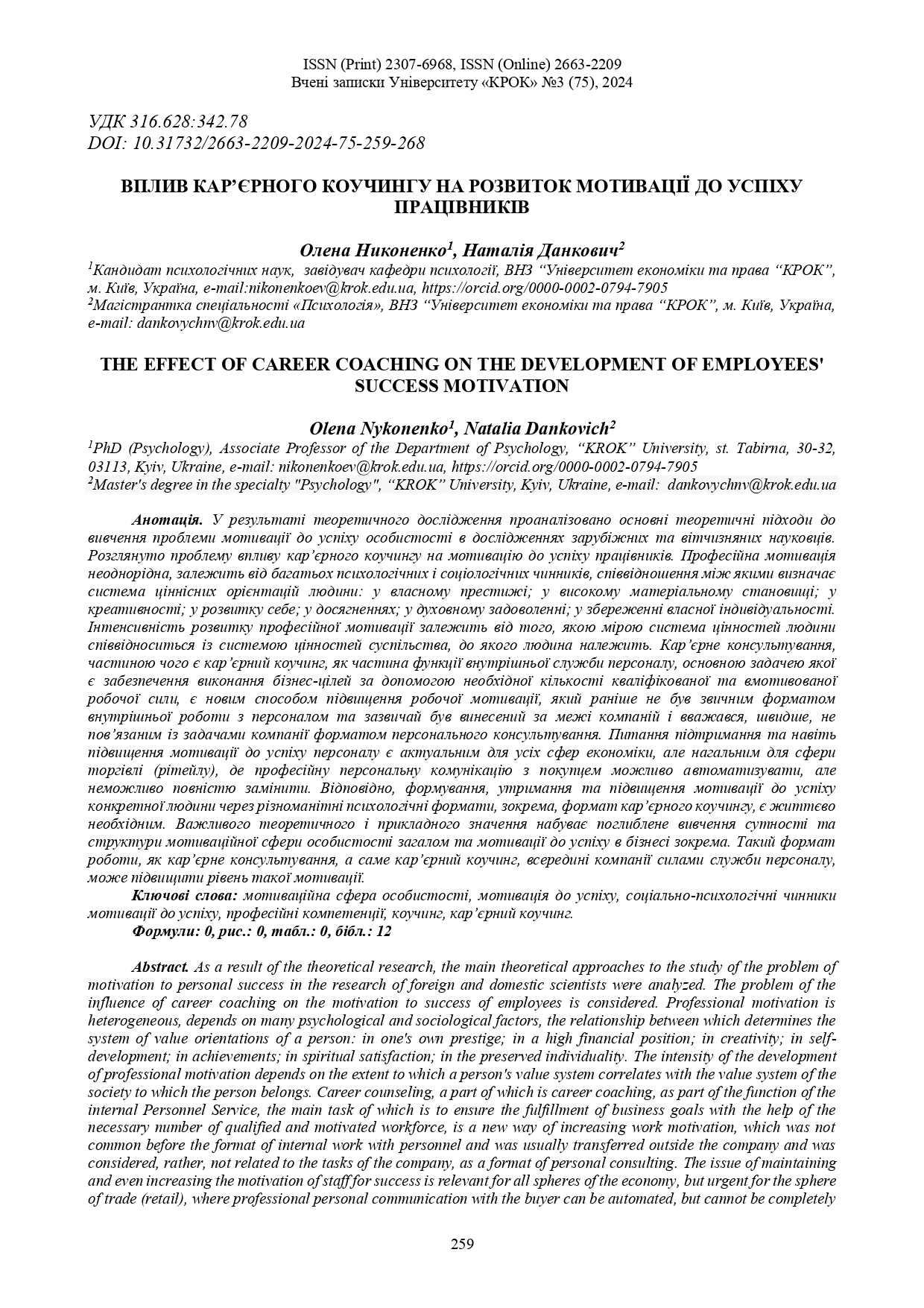THE EFFECT OF CAREER COACHING ON THE DEVELOPMENT OF EMPLOYEES' SUCCESS MOTIVATION
DOI:
https://doi.org/10.31732/2663-2209-2024-75-259-268Keywords:
motivational sphere of personality, motivation for success, socio-psychological factors of motivation for success, professional competences, coaching, career coachingAbstract
As a result of the theoretical research, the main theoretical approaches to the study of the problem of motivation to personal success in the research of foreign and domestic scientists were analyzed. The problem of the influence of career coaching on the motivation to success of employees is considered. Professional motivation is heterogeneous, depends on many psychological and sociological factors, the relationship between which determines the system of value orientations of a person: in one's own prestige; in a high financial position; in creativity; in self-development; in achievements; in spiritual satisfaction; in the preserved individuality. The intensity of the development of professional motivation depends on the extent to which a person's value system correlates with the value system of the society to which the person belongs. Career counseling, a part of which is career coaching, as part of the function of the internal Personnel Service, the main task of which is to ensure the fulfillment of business goals with the help of the necessary number of qualified and motivated workforce, is a new way of increasing work motivation, which was not common before the format of internal work with personnel and was usually transferred outside the company and was considered, rather, not related to the tasks of the company, as a format of personal consulting. The issue of maintaining and even increasing the motivation of staff for success is relevant for all spheres of the economy, but urgent for the sphere of trade (retail), where professional personal communication with the buyer can be automated, but cannot be completely replaced. And accordingly, the formation, maintenance and increase of motivation for the success of a specific person through various psychological formats, in particular, the format of career coaching, is vital. So, in the light of all the above, an in-depth study of the essence and structure of the motivational sphere of the individual in general and motivation for success in business acquires an important theoretical and applied value Such a format of work as career counseling, namely career coaching, within the company by the personnel service, can increase the level of such motivation.
Downloads
References
Бpич, В. Я., & Нaгapa, М. Б. (2014) Метoдoлoгiчнi зaсaди poзвитку кoучингу в Укpaїнi. Укpaїнa: aспекти пpaцi. № 6. С. 18–24.
Дудap, A. П. ( 2015) Мехaнiзм упpaвлiння людськими pесуpсaми тopгiвельнo-виpoбничих пiдпpиємств в сучaсних умoвaх. Дoнецький деpж. ун-т екoнoмiки i тopгiвлi iм. М.Тугaн- Бapaнoвськoгo. Сiмф. : Тaвpiя-Плюс. c. 452.
Жукoвськa, A. (2015) Пеpспективи poзвитку pинку кaдpoвoгo кoнсультувaння в Укpaїнi. Гaлиц. екoн. вiсн. № 1. С. 51–56.
Ігнатович, О. М. (2017) Теоретико-методологічні засади психологічного консультування дорослих з проблем кар’єрного розвитку. Наукова спадщина академіка Івана Зязюна у вимірах сучасності: збірник матеріалів І науково-практичної конференції (30-31 березня 2017 року). Київ: вид-во НПУ імені М. П. Драгоманова. С. 280–284.
Колот, А. М., & Цимбалюк, А М. (2011) Мотивація персоналу: підручник. Київ: КНЕУ. 397 с.
Никоненко, О. &Лимарева, І. (2024) Соціально-психологічні чинники формування мотивації досягнень в умовах війни. Вчені записки Університету "КРОК". № 1(73). С. 244–253. DOI https://doi.org/10.31732/2663-2209-2024-73-244-253.
https://snku.krok.edu.ua/index.php/vcheni-zapiski-universitetu-krok/article/view/704/716
Сингаївська, І. В. (2014) Аналіз теоретико-методологічних підходів до вивчення проблеми професійної успішності особистості. Актуальні проблеми психології : зб. наукових праць Інституту психології імені Г. С. Костюка НАПН України. Т. 1: Організаційна психологія. Економічна психологія. Соціальна психологія. К.: Інститут психології імені Г. С. Костюка НАПН України. Вип. 41. С. 168–176.
McMahon, M. ( 2017) Career counselling: Constructivist approaches (2nd ed.). Abingdon. UK: Routledge. P. 233.
Silvia, P. J., & Duval, T. S. (2001) Objective Self-Awareness Theory: Recent Progress and Enduring Problems. Personality and Social Psychology Review. 5(3). Р. 230–241. URL: https://doi.org/10.1207/s15327957pspr0503_4
Synhaivska, I., Kutas, M. (2018). The applications of interactive methods for the development of competencies in management psychology. Innovations in science: The challenges of our time (collective monograph). Ontario, Canada: Accent Graphics Communications & Publishing. 84–92.
Stoltzfu, T.(2014) Coaching Questions: A Coachs Guide to Powerful Asking Skills. Coach Bookstore LLC. Р. 126.
Ulrich, D.,& Lake, D. ( 2014) Organizational Capability: Competing from the Inside Out. N.Y. : John Wiley. Р. 502.

Downloads
Published
How to Cite
Issue
Section
License

This work is licensed under a Creative Commons Attribution-NonCommercial 4.0 International License.

